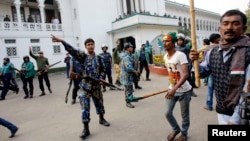NEW DELHI —
Bangladesh heads to the polls on Sunday but with opposition parties boycotting the election, there are questions about its credibility.
Campaigns, rallies and banners - the usual signs of an election - are missing from the Bangladesh capital, Dhaka. There is little need for all this.
With opposition parties boycotting the poll, the ruling Awami League party candidates have already won 154 of the 300 parliamentary seats being contested, making Sunday’s vote almost meaningless.
Professor of International Relations at Dhaka University, Imtiaz Ahmed, says even some former allies of the ruling party have joined the boycott.
“The very fact that more than 50 per cent of the seats where no election was held and not a single vote was cast, and they got elected, that has become a serious problem at this point. They got elected because there was only one candidate,” said Ahmed.
The atmosphere in the country is volatile. Violence has spiraled since elections were announced in late November. Scores have been killed in street protests.
Army troops have deployed to prevent more violence. Dhaka has been virtually blockaded from the rest of the country as authorities have suspended bus, train and ferry links into the city to foil street protests by opposition supporters.
Opposition parties have refused to participate in the election because the government abandoned the past practice of holding them under an interim administration. It scrapped the system two years ago. Political analysts say it could be because losses in local elections indicated waning support for the ruling party.
The United States, the European Union and the Commonwealth have declined to send observers for Sunday’s vote. They say conditions must be created for a transparent and inclusive poll and have urged the government to resolve the political impasse.
Dhaka University professor Amena Mohsin hopes Prime Minister Sheikh Hasinia will ultimately agree to stand aside for a caretaker administration which could supervise new elections.
“The International community has already said these elections are not credible. Nobody is taking it seriously. Everybody is thinking this is just a stopgap. I think the international pressure and escalation of violence, that will force her [Prime minister Sheikh Hasina] to take these measures,” said Amena Mohsin.
The political standoff over the polls comes amid heightened tensions in the country over a war crimes tribunal that has sentenced several Islamic leaders to death for their role in the 1971 war of independence.
Political polarization is not new to Bangladesh. The country’s two main parties are headed by women - Prime Minister Sheikh Hasina and opposition leader Khaleda Zia - whose arch rivalry has cast a shadow on the country’s politics for decades. But political analysts say the present crisis is among the most serious the country has faced.
Campaigns, rallies and banners - the usual signs of an election - are missing from the Bangladesh capital, Dhaka. There is little need for all this.
With opposition parties boycotting the poll, the ruling Awami League party candidates have already won 154 of the 300 parliamentary seats being contested, making Sunday’s vote almost meaningless.
Professor of International Relations at Dhaka University, Imtiaz Ahmed, says even some former allies of the ruling party have joined the boycott.
“The very fact that more than 50 per cent of the seats where no election was held and not a single vote was cast, and they got elected, that has become a serious problem at this point. They got elected because there was only one candidate,” said Ahmed.
The atmosphere in the country is volatile. Violence has spiraled since elections were announced in late November. Scores have been killed in street protests.
Army troops have deployed to prevent more violence. Dhaka has been virtually blockaded from the rest of the country as authorities have suspended bus, train and ferry links into the city to foil street protests by opposition supporters.
Opposition parties have refused to participate in the election because the government abandoned the past practice of holding them under an interim administration. It scrapped the system two years ago. Political analysts say it could be because losses in local elections indicated waning support for the ruling party.
The United States, the European Union and the Commonwealth have declined to send observers for Sunday’s vote. They say conditions must be created for a transparent and inclusive poll and have urged the government to resolve the political impasse.
Dhaka University professor Amena Mohsin hopes Prime Minister Sheikh Hasinia will ultimately agree to stand aside for a caretaker administration which could supervise new elections.
“The International community has already said these elections are not credible. Nobody is taking it seriously. Everybody is thinking this is just a stopgap. I think the international pressure and escalation of violence, that will force her [Prime minister Sheikh Hasina] to take these measures,” said Amena Mohsin.
The political standoff over the polls comes amid heightened tensions in the country over a war crimes tribunal that has sentenced several Islamic leaders to death for their role in the 1971 war of independence.
Political polarization is not new to Bangladesh. The country’s two main parties are headed by women - Prime Minister Sheikh Hasina and opposition leader Khaleda Zia - whose arch rivalry has cast a shadow on the country’s politics for decades. But political analysts say the present crisis is among the most serious the country has faced.




